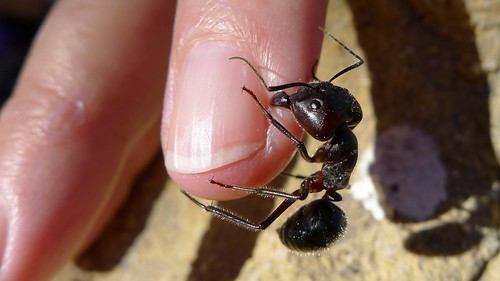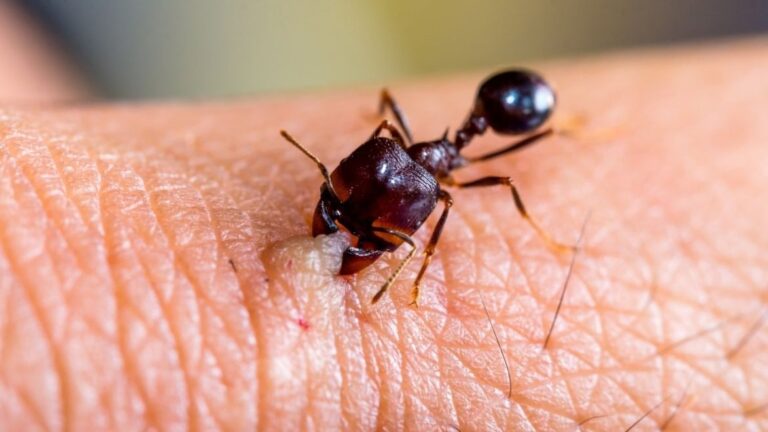Black, red, or brown Carpenter Ants tunnel through wood to create colonies. They are widespread in the United States but are more prevalent in the north. Carpenter Ants come in more than 1,000 different species. If you ever attempt to threaten or destroy a nest of Carpenter Ants, they may bite you in self-defense because they are very capable of damaging any wood in which they nest.
In this article, we’ll explore the symptoms and treatments of Carpenter Ants biting for you. Please keep reading.
What Do Carpenter Ants Look Like?
You must confirm that there are Carpenter Ants inside in order to implement a successful control strategy. Why? Because various ant species necessitate different approaches to treatment.
Despite being only half an inch long on average, Carpenter Ants are typically bigger than other ant species, such as fire ants. Carpenter Ants can even get up to an inch long in some cases, which is definitely not something you want to see in your house.
Carpenter Ants can be red, black, or a combination of the two colors; however, Texas Carpenter Ants typically have a black body with a red head and chest region. These insects can have wings in addition to having six legs and crooked antennae. Since Carpenter Ants are nocturnal, you might notice them more frequently as you prepare to go to bed.
Carpenter Ants: Do They Bite?
Ants don’t have teeth… so the term “bite” is incorrect. Carpenter Ants do have powerful jaws that enable them to chew through wood. What people label as a “Carpenter Ant bite” is actually their mandibles pinching and, due to their jaw strength, they will break the skin.
The pain and burning sensation that accompanies a Carpenter Ant “bite” is due to formic acid, which they secrete. Formic acid is also found in stinging nettles and transmitted by some other types of ants and insects.
What Is The Risk Of Carpenter Ant Bites?
It’s important for you to get some knowledge about how a Carpenter Ant bite feels if you’ve never experienced one. Understanding what to expect from a carpenter’s ant bite will make it easier for you to appreciate why it is advised to exercise caution around these ants.
The bites of Carpenter Ants are generally not dangerous. Although they are generally unharmful, they can still harm the wood in your home. Although they do not consume wood as termites do, these insects do tunnel through it to create their galleries and colonies.
Why Carpenter Ants Bite People?

There are a few key differences between the two pests, even though Carpenter Ants and the infamous fire ant are very similar. The reason these creatures bite is one of the most significant differences.
When humans or other animals, including our pets, pose a threat to them, Carpenter Ants may attack. These ants will leave you alone if you don’t interfere with them. You run the risk of getting bitten, though, if you try to squash them or pick one up to get rid of it.
Carpenter Ants would only attack you if you threatened their nest, which is the only other scenario. This situation is even riskier because it typically indicates that a large group of Carpenter Ants will be attacking you rather than just one.
Even if you make an effort to avoid them, these ants can be so tiny that sometimes you don’t realize what you’ve done until it’s too late. For instance, running into Carpenter Ants hill accidentally during a backyard game of catch can result in several bites.
You’ve had enough bites and damage to your home, and you’re ready for these pests to disappear.
Symptoms Of Carpenter Ant Bite
It’s not dangerous when a Carpenter Ant bites you, and it doesn’t look like any other kind of bite or sting.
If you’ve been outdoors and close to a colony, you might have noticed a bite. Your skin may appear a little bit red after being bitten, but the damage shouldn’t be too severe. Immediately following the bite, you might experience burning. These signs won’t persist.
Treatment Of Carpenter Ant Bite
When a Carpenter Ant bites you, you should immediately wash the bites with warm water and soap. If your skin is broken, clean the area before applying antibiotic ointment to the wound. If necessary, bandage the wound later. For a few days, make sure not to scratch any wounds that may start to itch or burn. In order to lessen the itching, you can also apply ice cubes to the bite wounds from a Carpenter Ant.
In addition to this, you can treat a Carpenter Ant bite with a few standard kitchens or home items. These items involve
- Lemon Juice and Baking Soda
- Apple Cider Vinegar
- Honey
- Cucumber
- Tooth Paste
- Salt
- Olive Oil
- etc.
Even though being bitten by a Carpenter Ant is relatively uncommon, if it does happen to you, the aforementioned remedy will unquestionably assist you in curing it.
How To Get Rid Of Carpenter Ants?
There are several ways to eliminate Carpenter Ants:
- Eliminate water sources that are near the colony. This entails sealing leaks and repairing the damage with wet wood.
- Keep lumber and other piles of wood away from your house.
- To prevent ants from using them to enter your home, make sure that no plants or trees are touching your property.
- When the windows are closed, caulk any cracks.
- To get rid of ants, think about using an ant spray or a homemade concoction of boric acid, water, and sugar. Use these medications as prescribed and keep them out of the reach of children and pets.
Where Are Carpenter Ant Nests Located?
In addition to seeing the actual insects, there are a few other visible indications of Carpenter Ants and their colonies.
Near tiny, 1/8-inch holes in the wood, you might spot shavings or what appears to be sawdust. Dead insects and small pieces of insulation that the ants may have drilled through are additional warning signs.
Additionally, outside of your home, in lumber, firewood piles, trees, or wooden poles, rotten or moist wood may support a colony of Carpenter Ants.
Conclusions
Carpenter Ants, which burrow through the wood to create very large colonies, are common and can be found in many different places. Humans are rarely bitten by these ants. However, other than the potential for burning, their bites rarely result in any negative side effects. If you have a bug bite with severe symptoms, it might be from another insect.
At best, Carpenter Ants can be an annoyance; at worst, they can be a very expensive problem. Calling in a pest expert is your best option if you really want to decide the best course of action and begin limiting the spread of Carpenter Ant damage.





